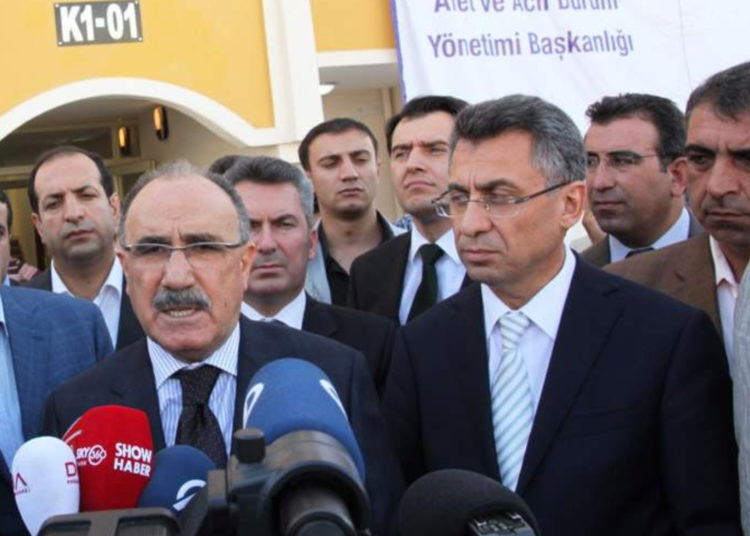Fuat Oktay, named vice president in the new Cabinet of Turkish Islamist leader Recep Tayyip Erdoğan to the surprise of many Turkey observers, is yet another confidante who helped his boss fan the Syrian civil war with the trafficking of foreign fighters and a steady supply of arms and logistics to jihadist groups.
Although he has never served as a member of Parliament or in any previous Erdoğan cabinets, Oktay’s selection as number two in the new Cabinet after the June 24, 2018 national and presidential elections came as a surprise to many even in the ruling Justice and Development Party (AKP). For Erdoğan, however, it is not an unexpected move to reward an operative for the clandestine work he had already done. As undersecretary of the now-defunct Office of the Prime Ministry between 2016 and 2018, Oktay had also overseen the mass purge of government employees and helped Erdoğan fill vacant seats with loyalists, partisans and Islamist zealots. He was the trusted, most senior bureaucrat in the government and kept Prime Minister Binali Yıldırım in check while Erdoğan completed his work of moving Turkey’s system of governance from a parliamentary democracy to an imperial presidency.
He has quite a polished resumé that tells about his years at Turkish Technic, the service arm of Turkey’s national flag carrier Turkish Airlines (THY), and a brief career in the Chicago auto industry after earning a Ph.D. in industrial engineering from Wayne State University in Michigan. A number of reports show he served at various companies and organizations including the now-bankrupt communications giant Türk Telekomünikasyon A.Ş. between July 2016 and July 2018. Yet, none of his resumé listings mention his senior role in an Islamist enterprise, Yimpaş (Yozgat İhtiyaç Maddeleri Pazarlama Anonim Şirketi) Holding, which defrauded hundreds of thousands of Turks, mostly in Germany and other European countries, in the 1990s by claiming that it adheres to Islamic rules of finance and provides high returns on investment.
Yimpaş, whose German arm, Yimpaş Verwaltungs GmbH, went bust in 2004 after collecting billions of euros from Turks, has had close ties to Islamist politicians in Turkey including Erdoğan. The holding misappropriated money that was invested in Yimpaş Verwaltungs GmbH by transferring it to Turkey under business schemes. When Erdoğan and his associates set up the AKP in 2001, part of the funding had in fact come from Yimpaş’s coffers. The fraud, which caused many Turks in Europe to lose their savings and hard-earned money, was investigated by German authorities. An international arrest warrant was even issued for Yimpaş’s chairman of the board Dursun Uyar in Turkey.
Erdoğan thwarted the German investigation’s expansion to Turkey by not cooperating and helped protect senior managers of the holding from serious criminal prosecution. Even a lawsuit filed in a local court in Yozgat by a victim, Ali Osman Yılmaz, who lives in Germany, was rejected by the Turkish court on Oct. 15, 2015 on the grounds that time had run out in the case since 2001, when the plaintiff invested 18,000 Deutsche marks in Yimpaş GmbH. The court also ruled that there was no connection between Yimpaş and its German arm. However, the Turkish Supreme Court of Appeals overturned the court’s decision on May 15, 2017 and ordered that the case be reheard. In a separate judgment on a related case, the top court ruled that the claim of no connection between Yimpaş and its German arm had no basis because Uyar was chairman of both firms. Despite these rulings, it would not make any difference today considering how Erdoğan has subordinated the Turkish judiciary to his rule and can very well quash any ruling he dislikes if he wants to.
While this embezzlement scheme that totaled to some $5 billion was ongoing, Oktay was a member of the board of Yimpaş. He was brought to the holding by Uyar, who is from Turkey’s central province of Yozgat, just like Oktay, who grew up in the same impoverished province. Although Uyar was convicted in 2002 of engaging in an unlawful initial public offering (IPO) in violation of the Law on Capital Markets, his sentencing was delayed on the pretext of health problems until 2007 with the help of Erdoğan. He was arrested in December 2007 and put in prison, only to be released nine months later to continue his business dealings. In the meantime, Oktay managed to escape legal troubles. His brother Nihat Oktay also worked for the accounting department of Yimpaş.
While Oktay was with Yimpaş, another man identified as Beşir Atalay, a hard-core Islamist and pro-Iranian zealot, was running the research arm of the holding called the Ankara Center for Social Studies (Ankara Sosyal Araştırmalar Merkezi, or ANAR). Atalay, an academic who was investigated for his links to the Islamic revolution in Iran during his youth, was one of the founding members of the AKP. He later served as a deputy minister and minister in various Erdoğan governments while ANAR was providing research support to the ruling AKP and helped provide talking points to shape public opinion during election campaigns. When Atalay was deputy prime minister responsible for AFAD, he brought in Oktay to head the agency. Atalay is no longer a member of the Cabinet but continues doing what he does best: shape the official narrative of the Erdoğan government by underwriting main themes and deciding on talking points that the Turkish president reads from scripted texts.
It is crystal clear that the corrupt Erdoğan keeps company with crooks, and Oktay’s choice has simply confirmed the pattern we have long seen in the governance of Turkey. Erdoğan runs a tight ship, and all his henchmen who have amassed power, positions and wealth will stick with him until the end. After all, if Erdoğan goes down, everyone aboard the same ship will sink to the bottom as well.












